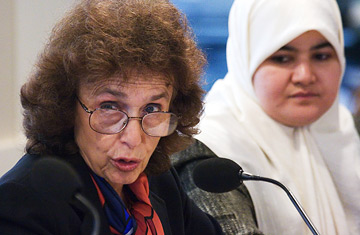
Iran has accused Haleh Esfandiari, a 67-year-old Iranian-American scholar detained in Tehran for the past two weeks, of being linked to a drive funded by Washington aimed at "overthrowing" the country's Islamic rulers.
Tehran's jailing of Haleh Esfandiari, a 67-year old grandmother who holds dual Iranian-American citizenship, as well as the interrogation of others with similar papers, is evidence that Washington's latest attempt to foist change on Iran is backfiring — as Iranian democracy advocates had warned. The Bush Administration had trumpeted its $61.1 million democracy program, including Farsi-language broadcasts into Iran, education and cultural exchanges and $20 million worth of support for "civil society, human rights, democratic reform and related outreach" as an important effort. However, sources tell TIME that several key Iranian reformers had repeatedly warned U.S. officials through back channels that the pro-democracy program was bound to expose them as vulnerable targets for a government crackdown whether they took Washington's funds or not.
Iranian civil rights activists contacted by TIME say that the cases against the Iranian-Americans have fostered the most repressive atmosphere inside Iran in years, making democracy advocates terrified to work or even speak on the telephone. Many are deeply reluctant to leave or re-enter the country, fearing that they will meet the same fate as Esfandiari, who was initially detained while heading to the airport after an eight-day visit to Iran to see her 93-year-old mother. She and at least two other Iranian-Americans were charged with espionage. Esfandiari is the director of the Woodrow Wilson Center's Mideast Program in Washington. The Wilson Center has strongly denied that she or the center has received any of the Bush Administration's funds.
Esfandiari has been a vocal proponent of greater dialogue between the U.S. and Iranian governments as a means of facilitating moderation in Iran and easing international tensions. "It is preposterous that she is accused of conspiring to overthrow the Iranian government by organizing conferences and encouraging dialogue between Iranians and Americans," says her husband, Shaul Bakhash, a noted Middle East scholar.
TIME's sources, who do not want to be identified for fear of retribution, say that they repeatedly warned about the negative consequences in informal talks that have been taking place for several years between figures in the U.S. and Iran who are close to their respective governments. Similar warnings were delivered to U.S. officials by others, including Trita Parsi, president of the National Iranian American Council. "We had talks with the State Department and with lawmakers," Parsi told TIME. "We pointed out the dangers. Our advice was not taken into consideration. Things have turned out worse than we expected." Parsi says that, in the past, individual democracy activists have been arrested without a pretext, but that the Bush Administration's program gave the regime an opportunity to go after as many as 10,000 non-government organizations and their memberships. "There is tremendous self-censorship going on," Parsi says. "They know that the money has made them targets." Speaking to TIME, a State Department official explained that because "dictatorships do react against any kind of rule-of-law, or democracy-promoting programs," the U.S. does not make public the names of recipients of program funds, although recipients are aware that the money is coming from the U.S.
